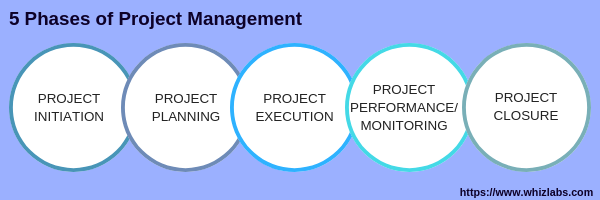Project management is a daily routine of the management. Planning, organization and controlling project activities are management routine. The project management defines the roles and responsibilities of the project team clearly.
Every project has its own life. The sequential phase is different for every project – from project idea to its closure. Each phase is defined by the organization, according to the set standards, the nature of the proposed project, area of application, use of technology.
PMP Certification Preparation – Start with Free Test Now!
There are 5 phases of the project management life cycle –
The Concept Phase of the project
This is the beginning phase where the concept of the project is prepared. The executive committee is the top management of the organization. The project is initiated by the executive committee only. They present different ideas for the proposed project. New objectives are defined, the purpose of the project and the list of deliverables is produced.
The Development Phase of the project
This is basically a planning phase, where all the resources are gathered and the planning activities begin during this phase. The future of the project is planned in detail. Each team member of the project, is assigned a particular task. Risk analysis is considered in this phase, because the risk and the uncertainty are highest in this phase. A detailed schedule is prepared by the planning engineer. The project leader is held responsible for the project activities, budgeting, resource utilization and the result.
The Execution Phase of the project
This is the longest phase of the project life cycle. Most of the resources are consumed in this phase. All the activities must be executed properly because the physical deliverables are presented to the client for final approval. So, this is very important phase of the project.
The Monitoring and Control Phase of the project
There are many processes implemented in this phase – time management, budget management, risks management and quality control. For the success of the project, all the activities must be kept on track, on a day-to-day basis. The focus is on keeping the whole team activities intact. The project leaders have the authority to use the tools and the skills, wherever necessary. They can identify the risk events that would disrupt the project plan and define the relevant changes.
The Delivery Phase of the project
The project is closed formally at the end of this phase. Proper attention is important at this phase, just as proper initiating or planning. The project manager must ensure the project is completed properly. When the project comes to an end, the written project review is prepared, including the entire success. The project is finally closed when all the deliverables are handed over to the client or the customer, along with the documentation.
Therefore, a project life cycle includes the series of phases of the project. The project management phases are determined by the project manager. Every phase occurs in a chronological manner and every phase is linked to each other for the creation of the end result of the project.
Final Words
We at Whizlabs are aimed to help you in having a bright career and so we bring project management certifications online training and practice tests.
So, join us today and take a step ahead towards bright project management career!
- Understanding The Critical Chain Project Management Method - June 23, 2014
- The Key Steps In The Project Portfolio Management - May 20, 2014
- Challenges For Project Managers In Global Project Management - May 19, 2014
- The Myths About The Tools In The Project Management - May 16, 2014
- The Three P’s Of The Project Management - May 8, 2014
- Importance Of Training For Project Managers - May 7, 2014
- The Project Managers And The Certification For Project Management Professional - May 6, 2014
- How Do Project Managers Improve The Project Performance - April 25, 2014


